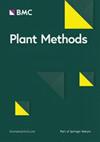GRABSEEDS: extraction of plant organ traits through image analysis
IF 4.7
2区 生物学
Q1 BIOCHEMICAL RESEARCH METHODS
引用次数: 0
Abstract
Phenotyping of plant traits presents a significant bottleneck in Quantitative Trait Loci (QTL) mapping and genome-wide association studies (GWAS). Computerized phenotyping using digital images promises rapid, robust, and reproducible measurements of dimension, shape, and color traits of plant organs, including grain, leaf, and floral traits. We introduce GRABSEEDS, which is specifically tailored to extract a comprehensive set of features from plant images based on state-of-the-art computer vision and deep learning methods. This command-line enabled tool, which is adept at managing varying light conditions, background disturbances, and overlapping objects, uses digital images to measure plant organ characteristics accurately and efficiently. GRABSEED has advanced features including label recognition and color correction in a batch setting. GRABSEEDS streamlines the plant phenotyping process and is effective in a variety of seed, floral and leaf trait studies for association with agronomic traits and stress conditions. Source code and documentations for GRABSEEDS are available at: https://github.com/tanghaibao/jcvi/wiki/GRABSEEDS .GRABSEEDS:通过图像分析提取植物器官特征
植物性状的表型是定量性状位点(QTL)绘图和全基因组关联研究(GWAS)的一个重要瓶颈。利用数字图像进行计算机表型可以快速、可靠、可重复地测量植物器官的尺寸、形状和颜色性状,包括谷物、叶片和花的性状。我们介绍的 GRABSEEDS 是基于最先进的计算机视觉和深度学习方法,为从植物图像中提取一整套特征而专门定制的。这款支持命令行的工具善于管理不同的光照条件、背景干扰和重叠对象,可利用数字图像准确高效地测量植物器官特征。GRABSEED 具有先进的功能,包括批量设置中的标签识别和颜色校正。GRABSEEDS 简化了植物表型分析流程,可有效用于各种种子、花卉和叶片性状研究,并与农艺性状和胁迫条件相关联。GRABSEEDS 的源代码和文档可在以下网址获取: https://github.com/tanghaibao/jcvi/wiki/GRABSEEDS 。
本文章由计算机程序翻译,如有差异,请以英文原文为准。
求助全文
约1分钟内获得全文
求助全文
来源期刊

Plant Methods
生物-植物科学
CiteScore
9.20
自引率
3.90%
发文量
121
审稿时长
2 months
期刊介绍:
Plant Methods is an open access, peer-reviewed, online journal for the plant research community that encompasses all aspects of technological innovation in the plant sciences.
There is no doubt that we have entered an exciting new era in plant biology. The completion of the Arabidopsis genome sequence, and the rapid progress being made in other plant genomics projects are providing unparalleled opportunities for progress in all areas of plant science. Nevertheless, enormous challenges lie ahead if we are to understand the function of every gene in the genome, and how the individual parts work together to make the whole organism. Achieving these goals will require an unprecedented collaborative effort, combining high-throughput, system-wide technologies with more focused approaches that integrate traditional disciplines such as cell biology, biochemistry and molecular genetics.
Technological innovation is probably the most important catalyst for progress in any scientific discipline. Plant Methods’ goal is to stimulate the development and adoption of new and improved techniques and research tools and, where appropriate, to promote consistency of methodologies for better integration of data from different laboratories.
 求助内容:
求助内容: 应助结果提醒方式:
应助结果提醒方式:


